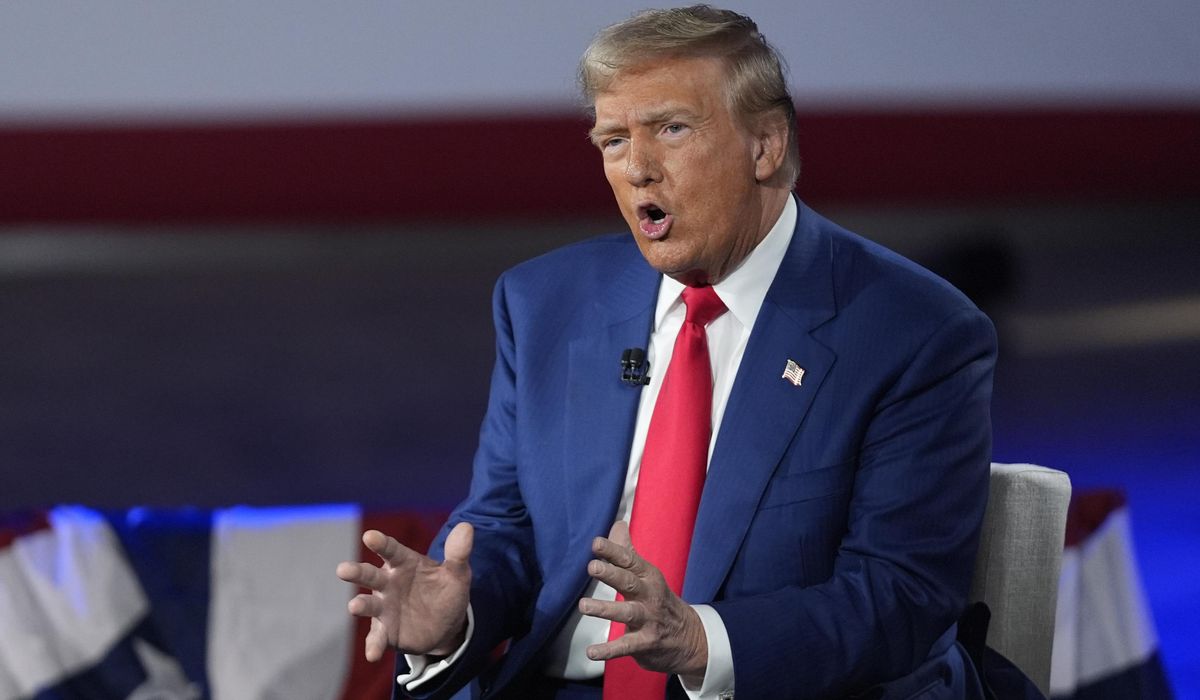


Former President Donald Trump’s federal election fraud charges returned to the U.S. District Court for the District of Columbia on Thursday, seven months after it paused for the Supreme Court to decide the issue of presidential immunity from prosecution.
Judge Tanya Chutkan, an Obama appointee, took the case back up after the Supreme Court ruled 6-3 in July that a president has immunity for official acts and presumed immunity for other conduct — but no immunity for unofficial acts.
The ruling was seen as a win for Mr. Trump in that it delays criminal proceedings against him while lower courts grapple with what charges can stand.
The feds adjusted their charges against Mr. Trump by narrowing parts of the original indictment related to his communications with his Justice Department following the high court’s immunity decision, but prosecutors kept all four original charges against him: conspiracy to defraud the United States, conspiracy to obstruct an official proceeding, obstruction and attempt to obstruct an official proceeding, and conspiracy against rights.
Mr. Trump, who wasn’t at the proceeding, pleaded not guilty through his lawyers to all of the alleged crimes on Thursday, and they asked the judge to let them first file a motion to dismiss the new indictment on the basis of the Supreme Court’s immunity ruling.
The sticking point for the two parties during Thursday’s 80-minute status hearing was essentially over which party will go first in filing next motions.
The defense said the Supreme Court’s immunity ruling supports the position that Mr. Trump’s communications with Vice President Mike Pence are presumed to have immunity, and thus, since the feds rely on those communications in their new indictment, the case against the former president crumbles.
Mr. Trump’s lawyer argued that means they should be able to file a motion to dismiss the indictment altogether before any more filings from the government.
“We may be dealing with an illegitimate indictment from the get-go,” said John Lauro, the lawyer representing Mr. Trump. “We get the opportunity to move to dismiss first under Rule 12 — why should the government get a special rule in this case that has never been adopted?”
Mr. Lauro also said that letting the government file its opening brief first following the high court’s immunity ruling would come at a sensitive time — hinting at the upcoming election.
“It is incredibly unfair that they are able to put in the public record — at a time in our nation’s history — they can’t ignore,” Mr. Lauro said. “Most of this information is under seal.”
Judge Chutkan smacked down any suggestions that the court should act based on the tight squeeze to the Nov. 5 election.
“This court is not concerned with the electoral schedule. Yes, there is an election coming,” the judge said. “That is nothing I am going to consider.”
In its status report filed Friday, Mr. Trump’s defense team said it plans to argue to dismiss the charges against Mr. Trump based on the Supreme Court’s immunity ruling as well as its ruling in a separate case where the high court erased the charge of obstructing an official proceeding against a Jan. 6, 2021, defendant, reasoning the feds stretched the statute too far to nab Capitol rioters.
In Fischer v. United States, the majority of justices recognized federal prosecutors were using a 2002 law, passed in the wake of the Enron accounting scandal and designed to capture conduct where someone ordered another person to disrupt a probe, against Jan. 6 protesters since their demonstration at the Capitol sent lawmakers hurrying for cover and disrupted the Electoral College count for hours.
Chief Justice John G. Roberts Jr. said the government misread the scope of the law.
“If Congress had wanted to authorize such penalties for any conduct that delays or influences a proceeding in any way, it would have said so,” the chief justice wrote.
Despite that ruling, prosecutors kept the charge against Mr. Trump in their new indictment.
Separately, Mr, Trump’s team said it will challenge special counsel Jack Smith’s standing to bring the case after a federal judge ruled last month that he had no authority to charge the former president in his classified documents case out of South Florida, reasoning Mr. Smith was never confirmed by the Senate to his position.
Judge Chutkan noted she didn’t find that ruling “very persuasive,” but added she would allow the defense to file a motion for this argument despite binding precedent in the D.C. Circuit supporting the Justice Department’s appointment of a special counsel.
The federal government, meanwhile, argued it should file an opening brief to tackle all immunity issues at once.
This filing would include all charges and evidence against Mr. Trump, including grand jury transcripts and witness interviews.
“We think all immunity determinations should be handled at the same time simultaneously,” said Thomas Windom, an attorney on behalf of the Justice Department.
Judge Chutkan said she would set deadlines for the parties in a separate order, “as soon as possible.”
• Alex Swoyer can be reached at aswoyer@washingtontimes.com.
